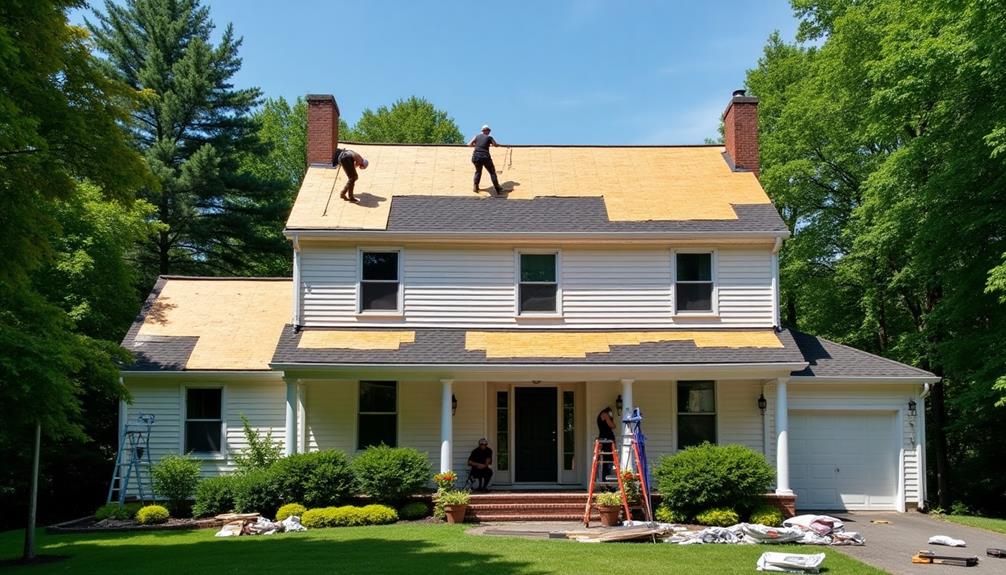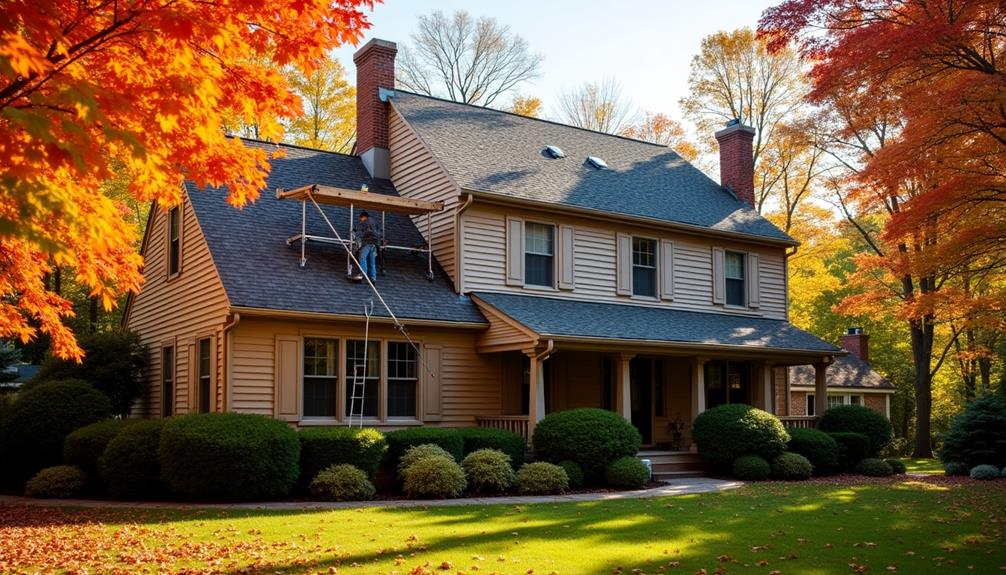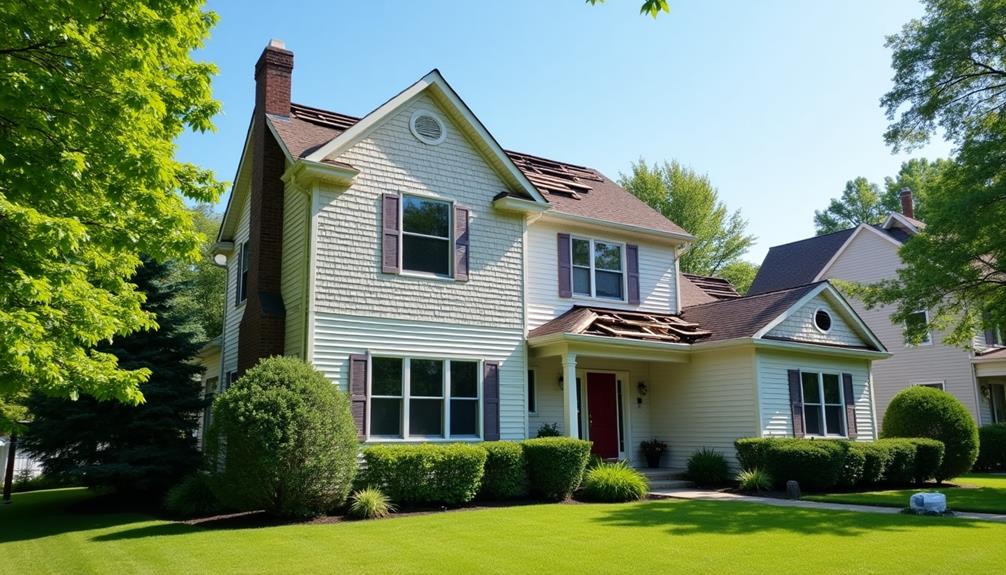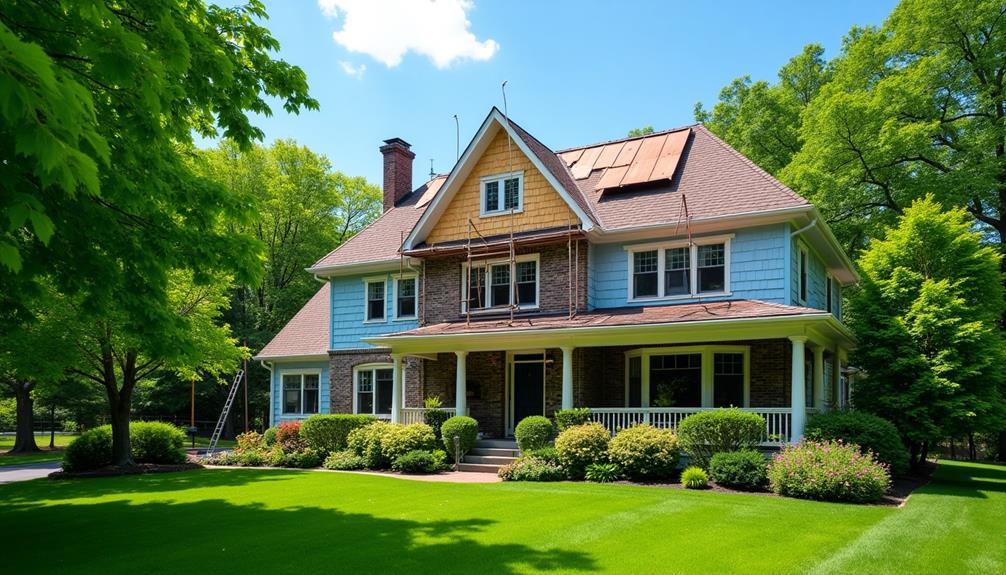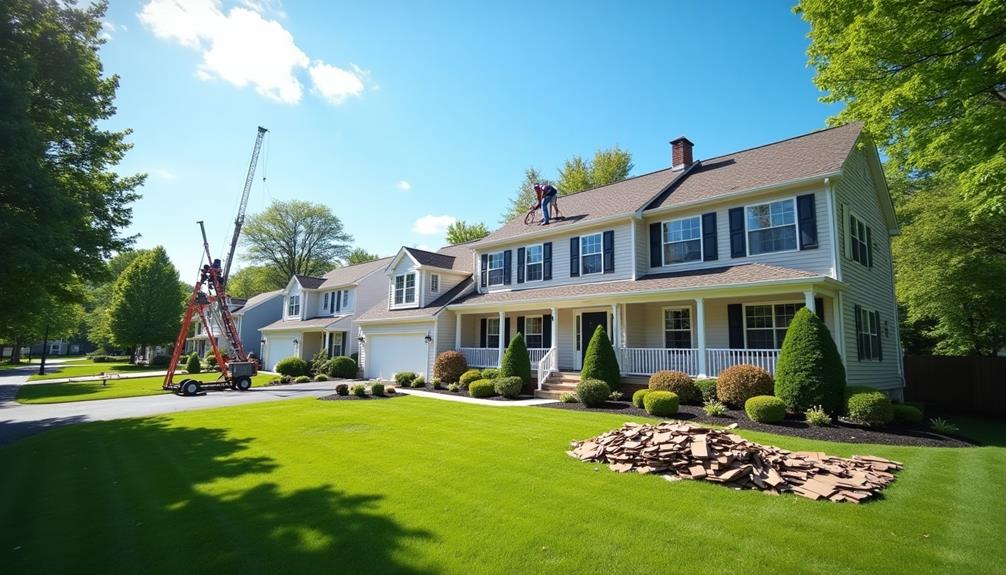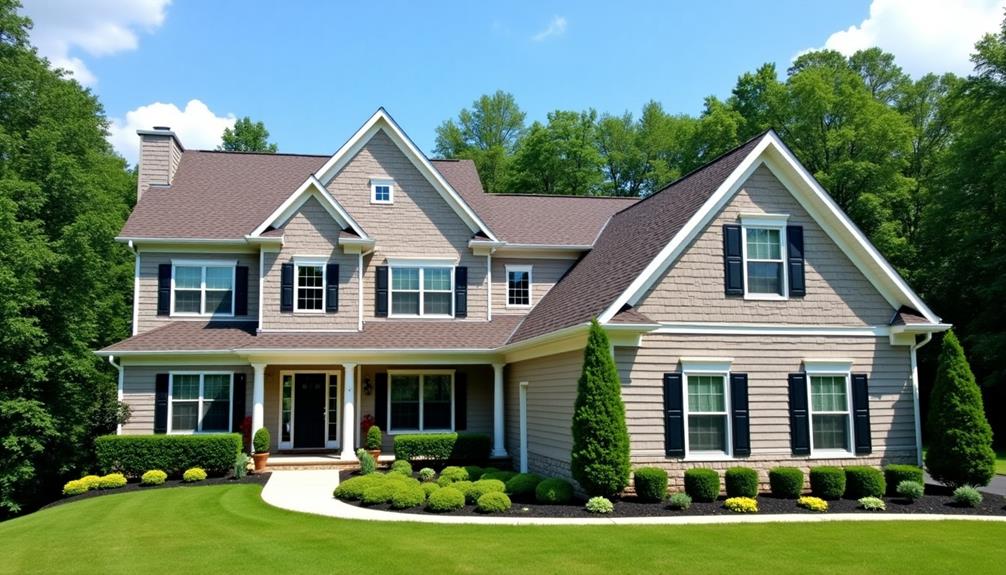If you're considering roof replacement in Trenton, NJ, it's crucial for your home's safety and efficiency. Look for signs like aging shingles, water stains, or ventilation issues, which indicate it's
Signs You Need a Roof Replacement
When it comes to your roof, ignoring early warning signs can lead to costly repairs down the line. One of the first indicators you should watch for is roof age. If your roof's nearing the end of its expected lifespan, it's time to assess its condition.
Look for water stains on your ceilings or walls; these can signal leaks that compromise your home's structural integrity.
Shingle damage, such as curling or missing shingles, can also indicate that your roof needs replacement. These issues not only affect your roof's appearance but can also impact your home's energy efficiency, leading to higher utility bills.
Ventilation issues may arise, causing heat and moisture buildup, which can further exacerbate mold growth.
After severe storms, inspect your roof for any signs of damage, as the impact can be significant. If you notice any of these signs, don't wait.
Addressing them promptly can save you from more extensive damage and expensive repairs. A proactive approach ensures that your home's safety and comfort are maintained, ultimately protecting your investment.
Choosing the Right Roofing Material
Choosing the right roofing material can make or break your home's durability and energy efficiency.
It's crucial to consider various options like asphalt shingles, metal, tile, or slate, each with its unique benefits. Asphalt shingles are popular due to their cost-effectiveness and ease of installation, but they may not offer the same energy efficiency as metal roofs, which reflect sunlight and reduce cooling costs.
If aesthetic appeal is a priority for you, materials like tile or slate can enhance your home's exterior while providing excellent durability. These options are often more expensive upfront, but their longevity can lead to savings over time.
Additionally, consider the climate in Trenton, NJ; materials that withstand high winds and heavy snow will be essential for long-term performance.
Don't forget to evaluate insulation properties as well. Proper insulation combined with the right roofing material can significantly improve your home's energy efficiency, reducing your utility bills.
Benefits of Roof Replacement
A timely roof replacement can significantly enhance your home's value, safety, and energy efficiency. When you invest in a new roof, you're not just replacing shingles; you're upgrading your entire home's protection against the elements.
A modern roofing system often includes improved insulation and ventilation, which can lead to substantial energy savings. This means lower utility bills for you and a more comfortable living environment year-round.
Moreover, a new roof provides a notable aesthetic improvement. It can revitalize your home's exterior, making it more appealing to potential buyers if you're considering selling in the future.
The right color and style can complement your home's architecture, increasing curb appeal and market value.
Safety is another crucial factor. An aging roof may develop leaks, mold, or structural weaknesses that pose risks to your family.
Understanding the Replacement Process
Navigating the roof replacement process can seem daunting, but understanding the steps involved makes it much more manageable.
First, assess your current roof's condition. Most roofs have a lifespan of 20 to 30 years, but factors like weather and maintenance can affect this. If you're experiencing leaks or visible wear, it may signal the need for a replacement.
Next, gather estimates from reputable contractors. This step is crucial as unexpected damages could arise during the replacement. A thorough inspection may reveal underlying issues like rotting wood or damaged insulation that need attention before the new roof goes on.
Once you've chosen a contractor, they'll typically begin with a detailed assessment and a plan tailored to your home.
Be prepared for material discussions; the type of roofing you select can influence your roof's longevity and performance.
Cost Factors to Consider
Understanding the various cost factors involved in roof replacement is key to budgeting effectively for this significant investment.
You'll want to consider the materials you choose; options range from asphalt shingles to metal roofs, each with different price points and longevity. Labor costs can also vary based on your location and the complexity of the installation.
Insurance considerations play a crucial role in your overall expenses. Check your policy to see what coverage is available for roof replacement. This can significantly offset your out-of-pocket costs, especially if the replacement is due to storm damage or other covered events.
Additionally, explore financing options that may be available to you. Many homeowners don't realize that various financial institutions and even roofing companies offer payment plans or loans tailored for roof replacements.
These options can make the financial burden more manageable, allowing you to spread the cost over time.
Finding a Reliable Contractor
Choosing the right contractor for your roof replacement is crucial to ensuring a successful project. Start by verifying contractor credentials. Look for licenses, insurance, and certifications that indicate they meet industry standards. A qualified contractor not only protects you but also ensures the work is done correctly and safely.
Next, don't overlook the value of online reviews. Check platforms like Google, Yelp, or the Better Business Bureau to gauge customer satisfaction. Pay attention to feedback about the contractor's reliability, craftsmanship, and communication. Positive reviews can provide peace of mind, while negative ones may signal potential issues.
Additionally, ask for references from past clients. Speaking directly to previous customers can give you insight into the contractor's work ethic and quality. A trustworthy contractor should have a portfolio showcasing completed projects, allowing you to assess their expertise.
Questions to Ask Your Contractor
When you're hiring a contractor for your roof replacement, it's crucial to ask about their experience and qualifications.
Understanding the warranty and materials they plan to use can also significantly impact the longevity and performance of your new roof.
Don't hesitate to gather this information, as it'll help ensure you make an informed decision.
Experience and Qualifications
Before hiring a contractor for your roof replacement in Trenton, NJ, it's crucial to assess their experience and qualifications. Start by asking about their roofing certifications. These credentials indicate that the contractor is trained and knowledgeable about industry standards and best practices.
Next, review their project portfolio to see examples of previous work. This will give you insight into their craftsmanship and the types of projects they specialize in. You want a contractor who demonstrates a history of successful roof replacements similar to what you need.
Here's a quick comparison table to help you evaluate potential contractors:
| Criteria | What to Look For |
|---|---|
| Roofing Certifications | Verify up-to-date certifications |
| Project Portfolio | Request a diverse range of completed projects |
Warranty and Materials Used
It's essential to understand the warranty and materials your contractor plans to use for your roof replacement. Before committing, ask your contractor about the specific materials they intend to utilize.
Different roofing materials offer varying levels of longevity, and knowing the best options for your home can save you money in the long run. For instance, asphalt shingles typically last 15-30 years, while metal roofing can last 40-70 years, providing you with better durability and lower maintenance costs.
Inquire about the warranty coverage included with those materials. A solid warranty can protect your investment and give you peace of mind.
Are you getting a manufacturer's warranty, a workmanship warranty, or both? Make sure to clarify the duration and what it covers, as this can significantly impact your future expenses.
Importance of Proper Roofing Installation
Proper roofing installation is crucial for ensuring the longevity and reliability of your home. When you invest in a roof replacement, it's essential to employ the right roofing techniques. This means understanding materials, slopes, and ventilation to effectively protect your home from the elements.
Installation mistakes can lead to significant issues down the line. A poorly installed roof may develop leaks, which can contribute to mold growth and structural damage. Additionally, many homeowners underestimate the importance of proper flashing and underlayment, which play vital roles in water management.
Choosing experienced professionals for your roofing project can make all the difference. They'll know how to avoid common pitfalls and will adhere to industry standards, ensuring a job well done. It's also beneficial to ask about their methodologies and warranties, as these factors can affect your roof's performance and lifespan.
Ultimately, proper installation not only enhances your home's aesthetics but also safeguards your investment. By prioritizing quality over shortcuts, you'll enjoy peace of mind knowing that your roof is built to withstand whatever nature throws at it.
Don't compromise—invest in a reliable installation for lasting protection.
Maintenance Tips After Replacement
After replacing your roof, regular inspections are crucial to identify any potential issues early on.
You should also clean your gutters frequently to prevent water damage and ensure proper drainage.
Regular Inspections Needed
To ensure your new roof remains in optimal condition, regular inspections are essential. These assessments help identify potential issues before they escalate into costly repairs, ultimately extending your roof's lifespan.
Ideally, you should schedule inspections at least twice a year—spring and fall are the most effective times. During these inspections, look for signs of wear and tear, such as loose shingles, cracks, or water stains inside your home.
Pay attention to the inspection frequency based on your roof type and local weather conditions. For instance, if you experience heavy storms or extreme temperatures, more frequent evaluations may be necessary.
Immediate inspections after severe weather events can catch damage early, preventing further deterioration.
Clean Gutters Frequently
Keeping your gutters clean is crucial for maintaining the integrity of your newly replaced roof. Clogged gutters can lead to water accumulation, which can cause significant damage not only to your roof but also to your home's foundation.
Regular gutter cleaning is essential to ensure that rainwater flows freely and efficiently away from your home. You should aim to inspect and clean your gutters at least twice a year, ideally in spring and fall.
During these cleanings, focus on debris removal, including leaves, twigs, and other obstructions. Using a sturdy ladder, carefully remove debris by hand or with a scoop, and consider a hose to flush out stubborn blockages.
Investing in gutter guards can also minimize the amount of debris that accumulates, reducing the frequency of cleanings. However, regular inspections are still necessary to catch any problems early.
Local Building Codes and Regulations
Navigating local building codes and regulations is crucial when planning a roof replacement in Trenton, NJ.
These codes are designed to ensure that your new roof meets safety standards and local zoning requirements, protecting both your property and the community. Before you start your project, it's essential to familiarize yourself with the specific regulations that apply to your area.
Start by checking with the Trenton municipal building department to determine any permits you'll need.
Many roof replacements require a permit, which ensures your work adheres to safety standards. Ignoring this step could lead to costly fines or even having to redo your roof.
Additionally, pay attention to local zoning laws that dictate the types of materials you can use and the design of your roof.
These regulations help maintain the aesthetic of your neighborhood and can influence your home's value.

